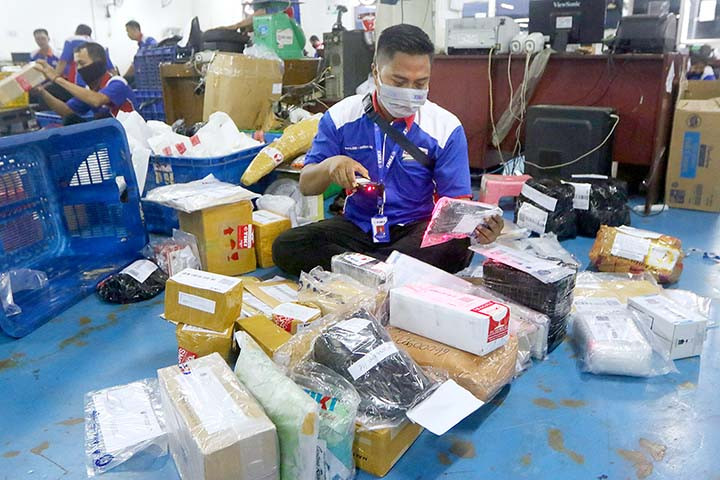Popular Reads
Top Results
Can't find what you're looking for?
View all search resultsPopular Reads
Top Results
Can't find what you're looking for?
View all search resultsInnovating and digitalizing logistics sector
Platforms and solutions such as mobile apps can help businesses improve data management, monitoring and communication.
Change text size
Gift Premium Articles
to Anyone
I
ndonesia’s logistics sector is facing an era of unprecedented change. Earlier in the year, we saw how COVID-19 induced lockdowns impacted transport operations, leading to the disruption of supply chains and trade flow. However, the silver lining is that the pandemic has also served as a catalyst for much needed innovation in the industry.
Unsurprisingly, COVID-19 has created shifts in consumer behavior, as many physical stores were forced to close and many flocked online to buy daily necessities. Indonesia’s e-commerce boom is only just beginning and these habits developed during the pandemic will increasingly become entrenched as the new normal for consumers going forward.
The increase in e-commerce volume has added pressure on the already strained supply chain and highlighted existing challenges in the logistics ecosystem, including poor infrastructure and lack of reliable technology and communication networks.
This has in turn forced industry players to look at reconfiguring their supply chain and accelerating their digital transformation. Many companies have begun to adopt technologies that enable the fulfillment of orders within a shorter time and at lower costs to meet rising customer demand.
Post COVID-19, as the industry positions itself for recovery and growth, technology will increasingly play a major role to enable all stakeholders, including shippers, transporters, warehouse owners and vendors, to become more efficient in responding to changing market realities.
Although logistics is the heart of domestic and international trade, uncertainty remains a huge problem in Indonesia’s supply chain, exacerbated by the country’s unique archipelagic makeup of 17,000 islands, which means goods cannot be transported using trucks on land alone. A multimodal system, using land and sea transportation as well as warehouses, is needed to reach remote areas of each island.
As a result, Indonesia has the highest logistics costs in Asia, accounting for 24 percent or nearly one-quarter of the country’s gross domestic product (GDP). This is in contrast to developed economies, where it is below 5 percent.
The industry is also fragmented, with a lack of transparency and real-time information. Eighty percent of trucks are owned by small and mid-sized players. Ninety percent of orders and matching are done offline and 80 percent of deliveries are done manually, with slow verification and lack of instructions. Contracts are usually handwritten; communication is done through ad hoc channels such as WhatsApp, and drivers may only receive payment months after they complete a delivery.
The end result is often chaotic and this has resulted in the inefficient utilization of resources such as trucks and warehouses, and long waiting time for drivers.
These problems are not new but the pandemic has created an urgency for both existing players and new entrants to develop and implement solutions that drive efficiency and lower costs for the industry. As a logistics technology company, we are solution driven in our approach to innovation as we see technology as a means to eliminate uncertainty in the supply chain.
By using technology to match supply and demand through a curated marketplace platform, shippers and businesses can be easily connected to readily available warehouses and trucks. The idea of a curated platform is especially important in enhancing efficiencies in the supply chain, as it matches shippers and businesses based on their needs and existing capabilities. This is in contrast to an open marketplace, where matching is generally done based on prices, without considering the various parties’ processes and various transportation requirements.
The benefits of such technologies are numerous. Platforms and solutions such as mobile apps can help businesses improve data management, monitoring and communication. This leads to lower and more predictable supply chain costs, as businesses no longer need to invest in their own infrastructure across various geographies. Instead, they can leverage on the economies of scale from using existing warehouse networks for consolidation or deconsolidation of goods, ensuring flexibility and faster access to markets.
The use of technology also offers businesses the ability to track their inventories, helping to reduce uncertainty in their operations as they no longer need to stock up on goods unnecessarily. For transporters and their drivers, technology has led to reduced verification time and improved processes. This has in turn improved truck utilization, creating more jobs and higher income for drivers.
Logistics technology has been touted to be the next emerging sector on Indonesia’s quest to develop its digital economy. The Industry Ministry has continually called for the digital transformation of the supply chain and logistic sectors as part of its Making Indonesia 4.0 road map. Some of the technologies highlighted by the ministry include Internet of Things, IT standards, data analytics, cloud, blockchain, robotics and automation.
Last September, the government announced the National Logistics Ecosystem (NLE) reform plan, which aims to cut logistics costs to 17 percent of GDP. Through this initiative, it is hoped that logistics costs and price disparities will be lower due to the integration of digital platforms across the government and the private sector. We are optimistic about the prospects of the NLE plan and have already registered as a logistics business player.
Logistics players should be supportive of the government’s plans to create a safe, reliable and efficient logistics sector to drive economic development in Indonesia. By adopting the right tools at the right time, we see technology as a means to create value for all industry stakeholders.
As a logistics technology player, we are excited to play a key role in driving the development of the sector through technology, and welcome the opportunity to work with partners, businesses and solution providers to improve logistics efficiency.
***
The writer is CEO and cofounder of Waresix, an Indonesian logistics start-up.










